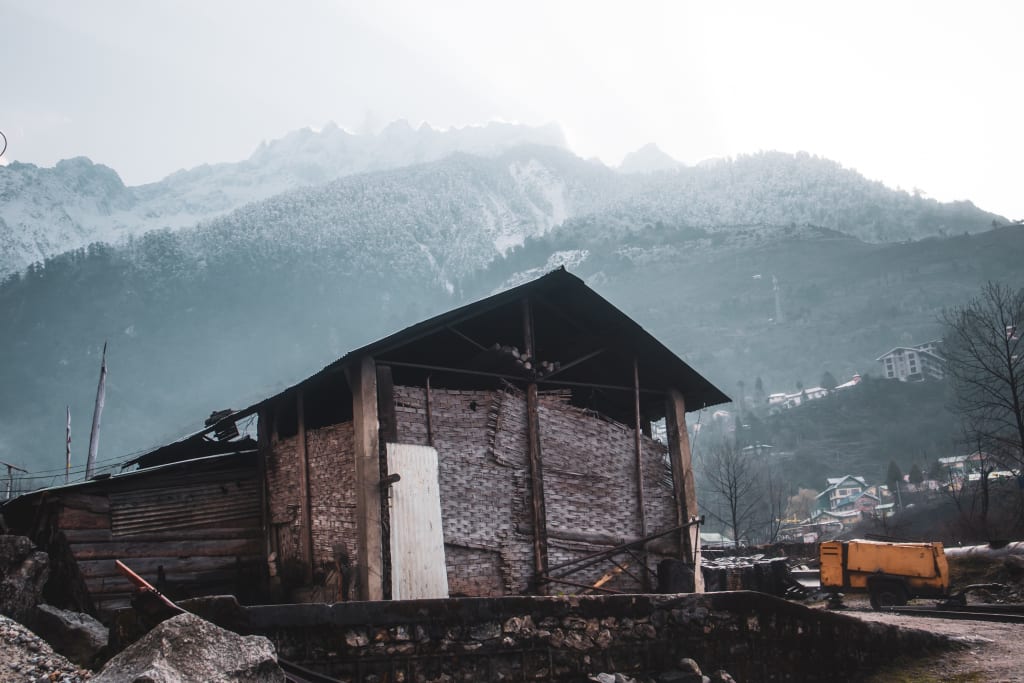The Way We Tell It
The official story

I was in a slapped-together bar at the back of a repossessed property. The bar was illegal, but I didn’t care. I retired from the force and didn’t need to care anymore. The bartender was the eponymous owner of the place—Milly of Milly’s Shed. It was really three sheds, cut and nailed together.
“You haven’t been here before. What’s good, man?” asked Milly. He was in his forties, but had the mannerisms of a graying flower child.
“We met before, a few years ago.”
He looked at me with squint-eyed focus. The light bulb never lit, and I saw he was going to pretend it did.
“I was the cop sent to get you to shut down your bar,”
Conversations didn’t stop, but they dimmed at the mention of “cop.” Milly finally recognized me and smiled wide.
“Well shit. I see you’re not in uniform, though. Are you here to partake?” he said, motioning to the metal shelves behind him which held all the finest bottom-shelf booze. I could tell he wasn’t expecting me to say yes.
“Actually, yes. I am,” I said.
When I came here to shut him down, I found he wasn’t charging for drinks. He had a bucket for money, but he didn’t technically charge for anything. It was little more than a hangout spot, not operating as a true bar, so we couldn’t shut it down. The whole time, he was nothing but cheerful and chatty. Later, I suspected his happy-go-lucky hippie thing was just a mask for a much more intelligent man.
He searched my face for sincerity. He found it because I was sincere. I wanted to drink somewhere no one knew me, and this place had stayed in the back of my mind. So, I placed $50 in the bucket. His smile lessened in breadth, but became, itself, more sincere.
“Well alright, brother. What’ll you have?”
I had beer. I didn’t know what kind it was. The writing on the can looked Russian, but it tasted fine.
“So then, what brings an upstanding civil servant to the ass end of nowhere?”
“I retired, and I’m bored.” I said.
“A pain in the ass to come here just because you’re bored—but then I walked ¾ of the Pacific Crest trail because I was bored, so I suppose this ain’t so strange.”
“Why only ¾?”
“Got bored,” he said.
People not used to having cops around invariably endeavor down a predictable path of questions. It was no different here. People came over to introduce themselves and I, for no real reason other than being a new face, became the uncomfortable center of attention.
There’s not a strict order to the questions, but they follow orders of severity. The first is never heavy.
“How long were you on the force?” a woman asked.
“What was the craziest thing you’ve seen?” a different woman asked.
And then, the final escalation. This one from a very drunk man with long, brown hair.
“Have you ever killed anyone?”
When I was younger, this question would have bothered me more. It didn’t, anymore.
“I have,” I said.
I saw Milly looking at me, reading me. He wasn’t the only one adept at reading people, and discomfort and curiosity played over his age lines. So I started telling my story. It was why I retired as soon as I was able. But it was only a version of the truth—the official lie.
“About a decade ago, we got a warrant for a possible drug den.”
Our warrant had actually been for a guy who skipped out on a jury summons. He’d moved four years prior and never received them. His current address was in the system, but the summons went to his old one, as did the court summons. The warrant was for that same old address.
“There had been a lot of rumors about an influx of opioids in the area. After an investigation, we located the house it had come from.”
We suspected the guy we were after of spray painting ‘King Pigshit’ on the Sheriff’s private car, because he’d been detained after a protest the year before. Though we ultimately released him. The Sheriff was still angry about it. When the man’s name came up in the database for the jury thing, the Sheriff seized the opportunity.
“We also suspected that the people inside might be armed, and dangerous. So we received approval of a no-knock raid.”
This was sort of true. Our man had a registered firearm. The Sheriff used this piece of information as justification that he might be dangerous and, rather than question the use of a raid at all, the judge signed off on a no-knock. The Sheriff wanted the man’s arrest to be as unpleasant as the law allowed.
“It was a small house. The yard was dark, and the house’s porch lights were off, so we used the darkness for cover. When we got near, though, we heard a disturbance, and the lights went on.”
There was no disturbance, and the lights came on because none of us considered motion sensors.
And, of course, we were at the wrong house.
“People shouted inside, so there was no time to do a proper formation. The guy with the battering ram ran up and crashed the door open. I was in front with a shield, and a .45 I held over the top. We charged in, and someone moved on my left. I had to focus forward, and trust my team would handle their areas of responsibility. The guy behind me neutralized the threat to my left as a large dog came charging from the kitchen—we put it down and flowed past it.”
There’d been no reason to rush. We lined up and the man in charge of the battering ram left it in the van and had to go back for it. When he returned, he tripped and threw the battering ram forward as he caught himself. It hit, by chance, precisely where it was supposed to and busted the door open. I led the cluster of men through. There was a man, but he was still struggling to get off a recliner when two of my teammates panicked and riddled him with bullets. The dog was just a tiny rat-haired thing that we trampled to death as we moved into the kitchen.
“We went into the kitchen and to our left was a dark hallway.” I paused here and took a breath. It probably seemed like a deliberate act to convey my trepidation about discussing the following events. But the breath was genuine, because I still dreamed of this. I have seared it into my memory.
“I saw a shape moving. It looked armed, and I shouted for it to get on the ground—and it refused. So I shot it. It was a young man.”
I never gave a warning. I saw nothing. I slipped on water from a bowl that the dead dog must have knocked over. It was a minor slip, but I squeezed the trigger of my gun reflexively. A single bullet went through the right eye of a teenage boy, and then out the back of his head. A lucky shot. It wasn’t a large house, nor a long hallway. His momentum carried him forward until he sprawled, twitching, in the kitchen. His mouth opened and closed like a fish drowning in air. I didn’t stick around to watch him quit trying.
“There were three doors, two opened and one closed. One was a bathroom. The other was the bedroom of the guy I just shot. I opened the other door and ran in, saw a woman hooked up to some kind of medical machine.”
Everyone in the bar sat stock still, listening. I’d been looking at my hands, willing them not to shake or squeeze the beer. There were two lights, one above the bar and one behind me, and the one behind me flickered. Chair legs dragged along the floor as its user adjusted position. Someone cleared their throat.
“Like I said, the house was small. Only a single story, two bedrooms, no basement. The rest of my team did another sweep of the house, and I stayed in the room with the woman.”
We were confused. The rest of my team regrouped in the living room to figure out what happened. I couldn’t move.
We were after a single white male. These people were not white. I learned they were immigrants from Thailand. The woman with the machine was the wife of the dead man in the living room, the mother of the dead kid in the kitchen. Years prior, she was severely injured in an accident that rendered her, among other things, paralyzed from the neck down. She needed constant care. The father and son each worked two jobs to pay for her medical care; the bills and the pills.
The pills were what we focused on.
“It was a family operation. The man in the living room was the bedridden woman’s husband. The person I shot in the hallway was her 19-year-old son. She was in an accident and was disabled. They were using her condition to get painkillers, which they sold to various criminal networks. They stole her medication, so they could make money.”
The logistics of the official story made little sense. Even if her family had been selling her medication, there were still the non-opioid drugs, and the nurse that came once a week. There were paper trails—paper freeways, really—detailing the vast expenses of her care, which the street value of her pills would not even dent.
We couldn’t prove anything about a drug ring, but no one asked us for proof. The warrant had been for the home we entered, and we retrofit the details to our new situation. A process that was far from flawless—but no one cared. They took us at our word. The department wasn’t interested in investigating their own guys and the press never caught on to the whole affair. The man we were after received a fine in the mail sometime later, challenged it in court, and we dropped the fine. As far as I know, he never knew about any of it.
The other patrons at the bar were blowing sympathetic sighs and patting me on the back. A tale sold and sold well. The guy with the long brown hair said, “Damn. That’s a hell of a story. Glad you made it out alright.”
I hated myself for feeling pride. “Well, it was my job.”
Then, in a moment marked by the flickering light going out, and making the one above the bar seem all the brighter, Milly spoke. “What about the woman?”
I looked up from my hands, which were clasped around the can, now crushed. “She had no relatives in the area. We got her in a facility where she would be properly taken care of. She didn’t live much longer, but I visited her when I could.”
This led to more pats on my back, more hero worship.
She was in a cheap palliative care facility. The kind where you don’t know how they stay running. It was that bad. I only visited her once, a month after the raid, and I didn’t know what to say to her. So I said nothing. Above her bed was a painting of a frontier scene featuring a bull being lassoed. The eyes of the bull and the eyes of the woman, immobile and helpless on the bed, held the same expression—deep, profound rage. She died not too long after.
The light above the bar haloed Milly’s head. The others in the bar bought it, but Milly’s face told me something else. His smile had gone insincere again as he cracked open another beer and set it before me. The man would serve me an unofficial drink, not unearned forgiveness.






Comments
There are no comments for this story
Be the first to respond and start the conversation.